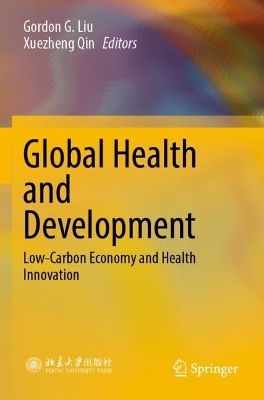
Global Health and Development
Springer Verlag, Singapore
978-981-19-9452-4 (ISBN)
This book proposes a collective effort to take pandemic prevention, preparedness, and response seriously and prioritize it accordingly to avoid the potential catastrophe in this inter-connected world by summarizing the lessons learned from the COVID-19. In the context of today’s climate change and its association with human health, the book presents the need for aligning climate and health goals and puts up with the multi-sectors and low-carbon economic strategies where health is prioritized in development.
Furthermore, when more and more novel medical and pharmaceutical items worldwide are launched, the health system could be improved. With the help of digital health,artificial intelligence (AI), and other innovative forms of healthcare products, the efficiency and effectiveness of healthcare services provision could be promoted, leading to a more promising future for human health.
This book vividly presents how such new technologies are applied to build an intelligent and robust health system and how innovations can be used to promote human health.
Gordon G. Liu Ph.D., is MOH Yangtze River Scholar Professor of Economics at the Peking University National School of Development; Dean of the PKU Institute for Global Health and Development; Director of PKU China Center for Health Economic Research, and Elected Fellow of the Chinese Academy of Medicine. Previously, he was on full-time faculty at University of Southern California, UNC-Chapel Hill, PKU Guanghua School of Management. He also served as President of Chinese Economists Society and Founding Chair of the ISPOR Asian Pacific Consortium. Currently, he is Co-organizer for the US-China Track II Dialogue on Health; he sits on China’s National Expert Panel on COVID-19 and the State Council Health Reform Advisory Commission. He co-chairs the Health Thematic Group of the UN Sustainable Development and Solution Network (SDSN) Leadership Council led by Jeffrey Sachs of Columbia University. He has served as Associate Editor for academic journals including Health Economics (2013–present),China Economic Quarterly (2013–2017), and Value in Health (2001–2012). Xuezheng Qin Ph.D., is a professor of economics at Peking University, where he serves as the deputy dean of the School of Economics and the Institute for Global Health and Development. His research interests include health economics, economics of human capital, and applied econometrics. Professor Qin’s research is funded by national and international agencies such as the National Natural Science Foundation of China and the International Development Research Center in Canada. He has published more than 70 academic papers in peer-reviewed journals such as Journal of Comparative Economics, Health Economics, and Health Policy and Planning. Professor Qin serves as an associate editor for China & World Economy and a guest editor for several journals including China Economic Review, Inquiry, and Emerging Markets Finance and Trade. He was elected as the president of China Labor Economist Forum and a distinguished professor of Beijing Higher Education and has gained other recognitions for his research and teaching.
Chapter 1. Global Health and Development.- Chapter 2. Digital Health.- Chapter 3. Low-Carbon Economy and Healthcare Innovation.
| Erscheinungsdatum | 05.05.2024 |
|---|---|
| Zusatzinfo | 8 Illustrations, color; 2 Illustrations, black and white; XX, 131 p. 10 illus., 8 illus. in color. |
| Verlagsort | Singapore |
| Sprache | englisch |
| Maße | 155 x 235 mm |
| Themenwelt | Medizin / Pharmazie ► Gesundheitswesen |
| Studium ► Querschnittsbereiche ► Prävention / Gesundheitsförderung | |
| Wirtschaft | |
| Schlagworte | Digital Health • Global Health • Healthcare innovation • Health Economics • Low-carbon economy • Public Health |
| ISBN-10 | 981-19-9452-8 / 9811994528 |
| ISBN-13 | 978-981-19-9452-4 / 9789811994524 |
| Zustand | Neuware |
| Informationen gemäß Produktsicherheitsverordnung (GPSR) | |
| Haben Sie eine Frage zum Produkt? |
aus dem Bereich


